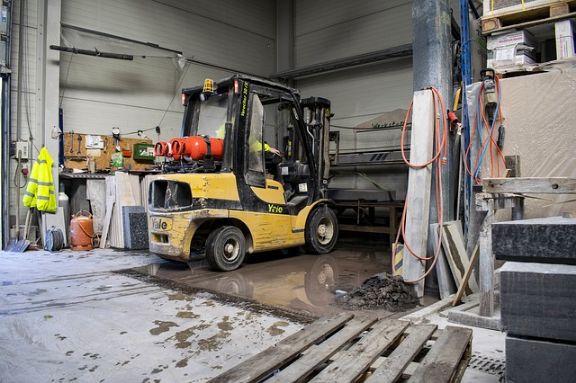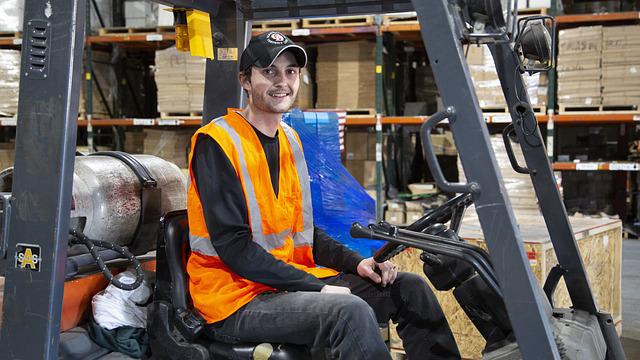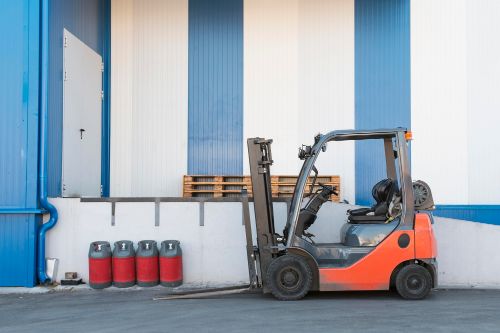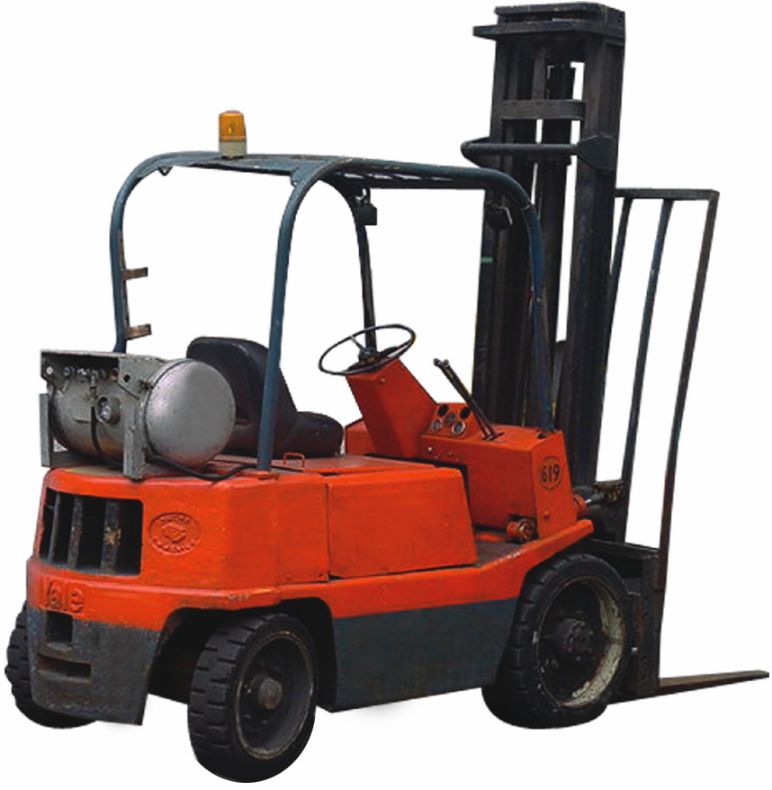
This question is often asked by people who are looking to buy a forklift. Forklifts run on liquid propane, not gas. Propane is a popular fuel for forklifts because of its low cost and ease of use. Propane forklifts emit less carbon dioxide compared to their diesel counterpart.
Propane-powered forklifts are more efficient and cost-effective than the traditional diesel-powered ones. They use liquid propane which is cheaper to buy, less expensive to transport, and has fewer emissions. Propane-powered forklifts also have a longer fuel life which means they need to be refueled less often.
For example, the fuel efficiency of a propane-powered forklift is 2.72 liters per hour which is approximately 6 lbs. While the efficiency of a diesel-powered forklift is 3 liters per hour. This means that the gas-powered propane forklift truck will get you more work done in an hour than a diesel-powered forklift can do in one hour.
But then again, those numbers are just average. There are factors that come into play that affect the operational efficiency of the equipment such as the behavior of the operator, weight of the load handled, travel distances, operation frequency, and condition of the vehicle.
Read related article: Why Forklift Tank Pressure Relief Valve Should Be in This Direction
What is Propane?
Propane, a hydrocarbon with the molecular formula C3H8, is a member of the alkane family. It’s often found mixed with other hydrocarbons, typically butane and larger molecules, in natural gas and petroleum. Once extracted, propane undergoes a refining process to separate it from the other compounds.
Commercially, it’s utilized for a myriad of applications, from cooking to heating to powering certain types of vehicles, including forklifts. Its versatility and high-energy combustion make it a valuable fuel source in many contexts.
The Dual Nature of Propane: Liquid and Gas
One of the defining characteristics of propane is its ability to exist both as a liquid and a gas, depending on the conditions it’s under:
- Liquid Under Pressure:
- When stored under pressure in tanks or cylinders, propane takes on a liquid form. This characteristic allows for a considerable amount of propane to be stored in a relatively small space, making it convenient for transport and commercial use.
- In its liquid state, propane is also colder due to the pressure-induced cooling effect. Direct contact can result in cold burns, which is why handlers usually wear protective gloves.
- Gas at Atmospheric Pressure:
- When released from its pressurized container, propane quickly expands and turns into a gas. This transition is due to its boiling point being -44°F (-42°C), meaning at most temperatures we encounter daily, it will vaporize rapidly once the pressure is reduced.
- As a gas, propane is heavier than air, causing it to settle low to the ground. This trait has safety implications, as it could accumulate in low-lying areas if there’s a leak, posing a potential fire hazard.
This ability to switch between liquid and gas states depending on the pressure conditions is what makes propane a versatile and practical fuel. Whether it’s being transported across countries in liquid form or being used to grill a steak in gaseous form, propane’s dual nature is central to its widespread use and value in the energy sector.
Read related article: How to Choose Forklift Propane Cylinders for Your Application
Why Do Forklifts Use Propane and Not Other Fuel?
- Forklifts are powered by HD-5 kind of propane because it is an efficient fuel with many benefits. It costs less than diesel fuel and requires less maintenance than gasoline or diesel engines. It also doesn’t produce as much smoke or carbon monoxide as gasoline or diesel engines.
- The propane tanks are also smaller and lighter, making them easier to transport and use on the job site. Spare bottles can be swapped quickly without having to go to a distant refueling station.
- Propane is much safer to store than gasoline or diesel; so if you don’t use the equipment that often in the workplace, propane can last long without gumming for a long period of time. However, in very cold weather, it is the other way around, propane freezes at -175C; gasoline and diesel don’t freeze even at this low temperature.
- Propane-powered forklifts are more efficient than electric ones because they don’t require any charging or batteries. The cost of owning an electric forklift is significantly higher because the batteries are too expensive in terms of maintenance; owning electric forklifts can have a big impact on the business outlay.
- Propane has a higher octane rating than diesel which means that it can be compressed more easily, making it easier for the engine to produce power with less fuel consumption.
Read related article: The Importance of Forklift Propane Tank Date Stamp
How Propane Forklifts Work
Propane forklifts are a popular choice among many industries due to their efficiency, relatively low emissions, and versatility in both indoor and outdoor settings. To understand their functionality, it’s crucial to delve into the mechanism behind propane-powered forklifts and the process by which propane transitions from liquid to gas before combustion.
1. The Mechanism of Propane-Powered Forklifts:
- Propane Tank: – This is where the liquid propane is stored under pressure. The tank is designed to withstand the pressures of propane in its liquid state and typically has a pressure relief valve for safety purposes.
- Regulator: – As propane exits the tank, it’s still in a high-pressure state. The regulator’s job is to reduce this pressure to a level that the forklift’s engine can handle.
- Mixer: – Once the propane’s pressure has been regulated, it moves on to the mixer. Here, the propane gas is mixed with air, creating an air-fuel mixture suitable for combustion in the engine.
- Combustion: – The air-fuel mixture is then introduced into the engine’s combustion chamber. When the forklift is started, a spark from the spark plug ignites this mixture, creating an explosion that pushes the engine’s pistons, thus driving the forklift.
2. Conversion Process: How Propane Transitions from Liquid to Gas Before Combustion:
- Liquid Storage: – Inside the propane tank, propane is stored as a liquid due to the high pressure. Given propane’s properties, it becomes a liquid when compressed even at relatively moderate pressures.
- Vaporization: – When the forklift’s engine demands fuel, liquid propane is released from the tank. As it exits the tank and encounters a reduction in pressure, it begins to boil and vaporize, transitioning from a liquid state to a gaseous state. This transition is aided by the ambient heat absorbed from the surrounding air, as propane has a boiling point of -44°F (-42°C), which means it vaporizes at temperatures higher than this.
- Ready for Combustion: – Once vaporized, propane gas travels through the regulator and mixer, as mentioned earlier, and is then ready for combustion in the engine.
Propane-powered forklifts harness the energy released during the combustion of propane gas. The transition of propane from liquid to gas is a fundamental part of this process, ensuring that the fuel is in the right state for efficient combustion. The design and mechanics of propane forklifts prioritize safety and efficiency, making them a reliable choice for various industrial applications.
Benefits and Drawbacks of Using Propane as Fuel for Forklifts
Understanding the advantages and disadvantages of propane as a forklift fuel can help businesses make informed decisions regarding their fleet operations. Here, we will explore the benefits and drawbacks in terms of efficiency, environmental impact, and safety when compared to other fuel sources.
1. Efficiency Comparisons with Other Forklift Fuel Sources:
Benefits:
- Quick Refueling: Unlike electric forklifts which require prolonged charging, propane forklifts can be quickly refueled, minimizing downtime.
- Consistent Power Output: Propane forklifts offer consistent power throughout the entire fuel tank, whereas battery-powered forklifts may experience reduced power as the battery drains.
- Longer Operating Times: Propane tanks can provide longer operating times compared to some batteries, especially in heavy-duty operations.
Drawbacks:
- Fuel Costs: Over time, purchasing propane can become more expensive than the electricity costs associated with charging electric forklifts.
- Benefits and Drawbacks of Using Propane as Fuel for ForkliftsEfficiency Loss: While propane engines are efficient, they don’t match the energy conversion rates of electric motors, which can directly convert much of their energy into movement.
2. Environmental Impact:
Benefits:
- Lower Emissions: Propane combusts cleaner than gasoline or diesel, resulting in fewer greenhouse gas emissions and pollutants.
- Non-toxic: In case of spills, propane doesn’t contaminate water or soil since it’s non-toxic.
Drawbacks:
- Still a Fossil Fuel: While cleaner than some alternatives, propane is still a fossil fuel, which means its extraction and use contribute to greenhouse gas emissions.
- Not Entirely Clean: Combustion of propane does release some amount of carbon dioxide, carbon monoxide, and other emissions, albeit at lower levels than gasoline or diesel.
3. Safety Considerations:
Benefits:
- Closed Fuel System: Propane forklifts have a closed fuel system, which reduces the risk of spills.
- Visible and Smellable: Propane is odorized with an agent that makes it smell (like rotten eggs), making leaks easily detectable.
- Low Flammability Range: Propane has a narrow range of concentrations within which it can ignite, making accidental ignition less likely compared to some other fuels.
Drawbacks:
- Potential for Leaks: Any system can develop leaks, and propane’s gaseous nature means it can spread rapidly if not contained.
- Hazards of Pressurized Tanks: Mishandling of pressurized propane tanks can lead to explosions or injuries.
- Cold Burns: Direct contact with liquid propane can cause cold burns due to its very low boiling point.
While propane presents a range of advantages in terms of refueling efficiency, reduced emissions, and certain safety features, it’s essential to weigh these against the associated costs, environmental concerns, and potential safety hazards. As always, proper training and handling practices can mitigate many of the risks associated with propane-powered forklifts.
How to Safely Handle Propane Tanks?
Propane safety has been an issue for a number of years. The gas has been the culprit in many fires and explosions that have caused fatalities in the past. However, propane safety has improved over the years with stricter regulations and better technology.
Here are some of the things you can do to protect you from accidents in handling propane and its containers:
- Operator training is required to operate the forklift truck. The training must include not only the actual operation of the equipment but also the safe handling and changing of the tanks. And since the tanks are quite heavy, manual handling training can be included in the operator training to prompt operators about the danger of handling these containers.
- When tanks are filled on-site, separate training must be given to operators that specifically tackle the safety and danger of filling propane into containers. Some states have their own regulation on this. Better to consult the committee or board in your state to make sure.
- Regular inspection must be done on the tanks to ensure that they are in good working condition prior to installation of the forklift. Any damage and corrosion to the metal must be immediately reported, and likewise, check the recertification date of each tank – it may already be due.
- Don’t use the forklift propane on other purposes other than powering the forklift. Some people convert the forklift tank for use on other appliances such as a grill, a generator, and heaters. It is prohibited to do the conversion.
The safety concerns with liquid propane are mostly due to the fact that it is a combustible fuel. This means that if it comes into contact with an ignition source, there is a chance for fire or explosion. But if you follow the recommendations above, accidents can be abated.
Do I Need a License or Training to Handle Propane?
Operating a forklift is a difficult task, and the other aspect is handling propane – it’s also one that requires some training. That said, operators or designated personnel need to have formal training in order to safely handle this liquid. They need to be trained by their employers on the safety procedures and proper handling of this liquid.
Likewise, a license must be obtained from a state. Licenses vary depending on the state. Obtaining a license requires one to undergo formal training and pass an examination and submit of application for the license.
Safety Precautions for Handling Propane in Forklifts
1. Best Practices for Handling Propane in Either Form:
a. Personal Protective Equipment (PPE): – Always wear safety gloves when changing or handling propane tanks to prevent cold burns. – Use safety goggles to protect eyes from potential splashes.
b. Storage and Transportation: – Store propane cylinders in a well-ventilated area, away from sources of ignition and direct sunlight. – Always store cylinders upright to ensure the pressure relief valve is at the top. – Transport cylinders using appropriate carts or hand trucks, ensuring they are secured in place.
c. Refueling Procedures: – Ensure the engine is turned off before refueling. – Check connections for tightness and ensure there are no visible damages. – Never overfill a propane cylinder. Typically, it should only be filled to about 80% to allow for expansion. – After refueling, perform a quick leak test using a soapy water solution. If bubbles form, there’s a leak.
d. General Handling: – Never drop or throw propane cylinders. – Avoid exposing propane tanks to excessive heat or open flames. – Make sure all forklift operators are trained in proper propane handling procedures.
2. Emergency Measures in Case of Leaks or Malfunctions:
a. Immediate Actions: – If you smell propane (a rotten egg-like odor) or suspect a leak, shut off the main gas supply valve if it’s safe to do so. – Evacuate the area immediately and avoid any actions that might create sparks, like starting engines or using electrical equipment.
b. Call for Help: – Once in a safe location, call emergency services or your local propane supplier for assistance. – Notify coworkers and superiors of the situation.
c. Ventilation: – If the leak is indoors, ventilate the area by opening doors and windows, if it’s safe to do so. – Ensure that any electrical ventilation systems are turned off to avoid potential sparks.
d. Containment: – If you’ve been trained and it’s safe, use appropriate measures to contain smaller leaks, such as applying soapy water to identify the source or tightening connections.
e. Avoid Ignition Sources: – Stay away from electrical appliances, phones, and switches. – Extinguish all open flames, and do not smoke in the vicinity.
f. Medical Attention: – If someone is exposed to propane or shows symptoms of propane inhalation (dizziness, headaches, nausea), seek medical attention immediately.
In all circumstances, the safety of personnel should be the top priority. Regular training sessions and safety drills can prepare teams to handle emergencies effectively and minimize potential hazards.
To Make a Conclusion
Propane is a unique fuel that can be both a liquid and a gas, depending on the conditions. This makes it useful for many things, like powering forklifts or cooking at home. But it’s essential to know how it works and its properties for safe and efficient use. Understanding propane’s two states helps businesses and users make smart decisions about storage, safety, and usage. In short, knowing more about propane’s nature is key to using it right.
If you are considering buying a forklift, you should know that they run on liquid propane. Tanks are to be filled regularly and tank maintenance is to be done routinely – and this comes with a cost but is much cheaper than using diesel and gasoline.

Mike is an experienced propane technician with over 15 years of professional experience in the field. He has dedicated his career to helping customers with their propane needs, from installation to maintenance and repair. Together with Jeremy, he co-founded this website to provide useful information and guidance to customers seeking reliable propane services.



